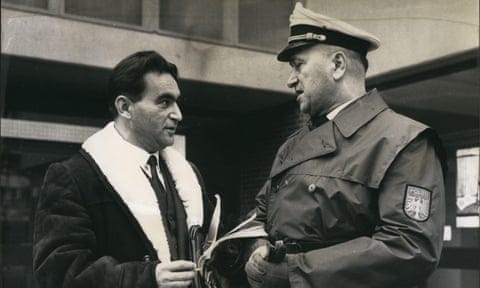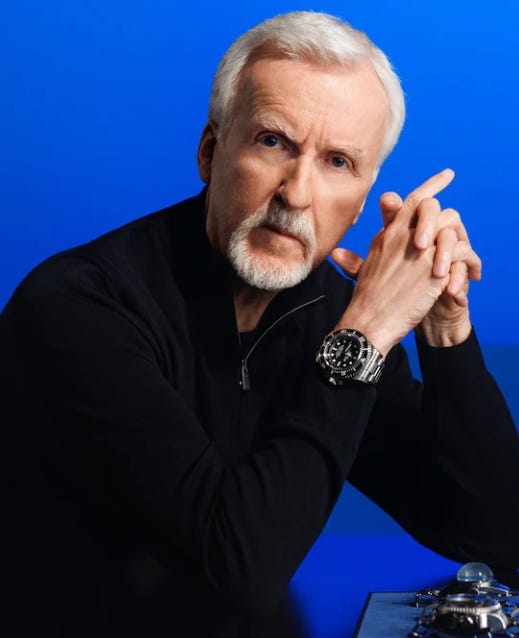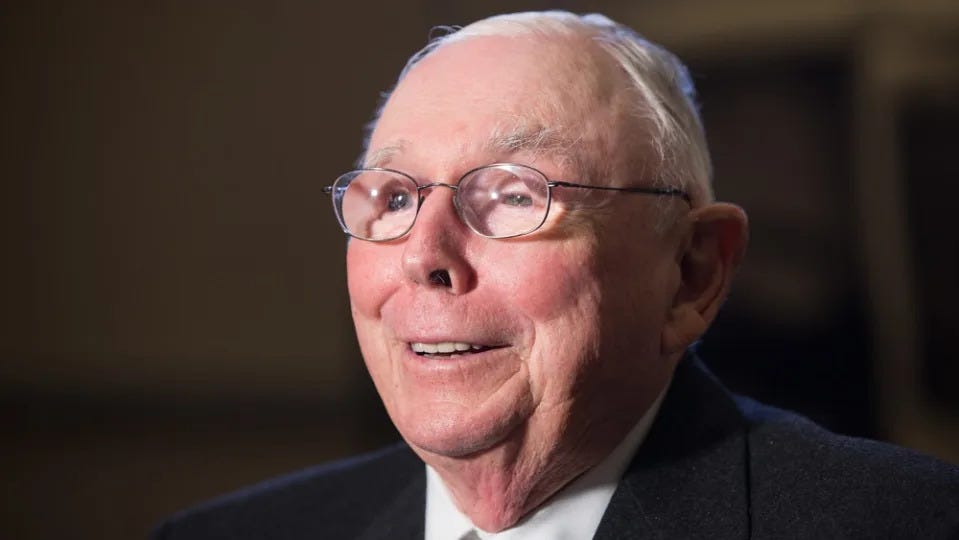Agency for watch collectors
If you truly desire a particular watch, actually do something about it.
As a watch collector, it has become increasingly common over the last couple of years to be denied access to things we might want. While that phenomenon has, since mid-2023, become less prevalent as the market for luxury watches has declined, I thought this concept was worth discussing for future reference.
The word “agency” has a few meanings and in this post, we will be exploring the word when defined as follows:
In this context, you may have heard the term “high agency” to describe people. This tends to describe people who feel a sense of control over their own lives, who are able to make decisions about what they want or need, and who take actions to meet those needs. In contrast, people with low agency are more likely to attribute outcomes in their lives to forces outside of their own control… they will strongly believe things like luck or fate are responsible for charting their progress and determining their fate. High agency is the quality which sets apart leaders who win from those who whine.
Let’s examine a few examples…
Landmesser

Historians believe this man (circled) to be August Landmesser. He refused to join the Germans in their Nazi salute, and was eventually imprisoned and killed for dating Irma Eckler, a Jewish woman. What we see here, is high agency in one image.
ScrewDownCrown is a reader-supported guide to the world of watch collecting, behavioural psychology, & other first world problems. Both free and paid subscriptions are available.
Waitzkin
I tend to observe a strong correlation between my good moods and good weather - when the sun is shining, there is a high chance I will be in an excellent mood all day. Fortunately I have, after living in the UK for 14 years, managed to prevent bad weather from causing a bad day or ruining my mood - and for a while I believed this was possibly true for all humans; ‘good’ weather and ‘bad’ weather are universal truths. Of course, that is nonsense; we have the ability to frame our perceptions. If you consider rainy weather to be ‘bad’ you tend to describe a ‘rainy day’ as a ‘bad day’ and this framing will naturally induce negativity. As Josh Waitzkin explains on Tim Ferris’ podcast - he spends storms outside with his son, having just as much fun as he could in ‘good’ weather. As a result, his son gets excited when there is ‘bad’ weather because the kid knows it will be fun! What Josh did, was teach his kid about high agency; to focus what could be controlled (attitude) and not to be reliant on external factors to achieve what he wanted (to have fun).
Shige

Yukio Shige has saved hundreds of lives. He is actually a retired police officer, but he saved all these lives after retiring! Instead of spending his retirement chilling out, he spends his is time earning the nickname “chotto matte” (“Wait a moment”) man. He hangs out with his binoculars, near the Tōjinbō cliffs in Fukui Prefecture in Japan, and prevents people from committing suicide. Here’s a 40 minute film and write up about this high agency legend.
Honda

“Success represents the 1% of your work which results from the 99% that is called failure.”
Soichiro Honda (Founder, Honda Motor Company)
At the age of 15, with no formal education, Soichiro Honda left home to pursue his dream. As a passionate engineer, all he wanted to do was work for the biggest engineering company he knew of at the time: Toyota. He worked day and night in his small workshop to make this dream a reality - even selling his wife’s jewellery and sleeping many nights alone in his workshop. After completing his revolutionary prototype piston ring, he took it to Toyota hoping to wow them. Instead, they rejected him. He went on to join a technical school to further improve his design, and 2 years later was awarded a contract by Toyota to supply them. Now he needed a factory to produce this stuff! This was close to war-time with the US, and the shortage of materials required him to invent a new method of making concrete to build the factory; guess what, he did it! It doesn’t end there… his factory ended up being bombed during the war… twice! When he needed to rebuild the factory, there wasn’t enough steel. So he collected US aircraft refuelling canisters to source the steel to rebuild his factory, calling them “little gifts from President Truman.” After rebuilding his factory in 1945, Japan experienced an earthquake which wiped out all his factories again. You would think the story ends there… but given we still see Honda vehicles on the road today, we know it didn’t end there. You can read the story for yourself, but Honda is a guy with insanely high agency"!
Cameron
No, not the imbecile British politician… Watch lovers will undoubtedly know James Cameron - but apart from his work with Rolex and diving, he has directed 3 of the top 4 grossing movies ever: (Avatar, Avatar 2, Titanic). Around the age of 20, Cameron worked odd jobs, including as a truck driver and a high school janitor.
Despite these circumstances, Cameron’s agency shone through. He decided he wanted to be a filmmaker, but couldn’t afford film school. To get around this, he would go to the library at USC, a film school he couldn’t afford - and photocopy workm from other students.
“I’d find somebody’s 300-page dissertation on optical printing, and I’d be going through it and I’d think, Well, I got to get this. So I’d pull the staples out and I’d photocopy the entire 300 pages. And then I just kept doing the same thing, week after week, for about six months. And I'm driving a truck, but I had these binders: Sodium process, blue screen, optical printing, film-stock emulsions, lenses, cinematography. I was going through this stuff, chapter and verse, and making my own notes and all that. I basically gave myself a college education in visual effects and cinematography while I was driving a truck.”
James Cameron
For the cost of a few hundred dollars in photocopies, Cameron put himself through a makeshift course in visual effects at the top film school in the country - and he did so without even meeting a single professor. High agency.
Munger
Any subscriber of SDC knows, Charlie Munger has many lessons to teach. I suppose there is ample evidence of Munger’s high agency already, but one story seems to fit well in this context.
At the age of 52, Munger developed cataracts and following a failed surgery, he found himself blind in one eye. Despite the pain and partial loss of vision, he knew how much he loved to read and consume information… so guess what he did? That’s right, he learned braille! The circumstances could not be changed, but his adaptability and high agency shone through.
Musk
Whatever you think of the man, he’s possibly the most high-profile character who continues to demonstrate his high agency. Everyone is aware of his serial defiance of norms... from electric vehicles, to reusable rockets and tunnels around the US. So rather than bore you with those stories, here’s one you may not have heard about.
In October 2008, the news outlet Valleywag published a letter from an employee at Tesla. Elon had called employees into a meeting and revealed the troubling newsthat they had only $9 million left in the bank. Meanwhile, the letter claimed, the company had taken more than 1,200 preorders for its electric cars - including thousands of dollars in deposits - but delivered fewer than 50 cars to customers. The letter concluded:
“I cannot conscientiously be a bystander anymore and allow my company to deceive the public and defraud our dear customers,” the employee wrote. “Our customers and the general public are the reason Tesla is so loved. The fact that they are being lied to is just wrong.”
Of course, Elon being Elon… he couldn’t stand by and let them get away with it. In her book about Elon, the writer explains how he found the culprit. He copied the text of the letter which was published, and pasted it into a Word document - then he checked the size of the file, and cross referenced it with the office’s printer logs, searching for a file size which matched the one he had created. Although there was no guarantee this employee would have printed it, Musk’s instincts were sound. He found a match, and subsequently tracked down the person who printed the letter. That employee ended up writing a letter of apology and resigning.
Gary Alford
Better known as The Tax Sleuth Who Took Down a Drug Lord - the NYT explains how Gary Alford grew up in Brooklyn in the 1980s; a short, half-black, half-Filipino kid in a tough neighborhood. His father was a math teacher who would cite the power of the subject to teach his son how to prevail over difficulties. “If you get the right answer, the teacher can’t tell you anything,” Mr. Alford remembers his father saying. That attitude led Mr. Alford to study accounting at Baruch College and then to the I.R.S., where his skeptical, lone-wolf approach worked well.

Alford’s supervisors at the I.R.S. assigned him to a D.E.A. task force working the Silk Road case in February 20131. The Strike Force, up to then, had made no progress finding meaningful leads. Basically using Google alone, Alford ferreted around the internet and in May 2013, landed on a chat room posting made just before Silk Road had gone online (in early 2011) - the post was by someone with the screen name “altoid” and it said: “Has anyone seen Silk Road yet? It’s kind of like an anonymous Amazon.com.” Based solely on how early-on this post was made, Alford figured this person must have some inside knowledge about Silk Road. So he kept digging. Alford eventually found a message which altoid had tried to delete - but had been preserved in the response of another user. In that post, altoid asked for some programming help and gave his email address: rossulbricht@gmail.com. The rest, of course, is history (see footnote 1) - high agency is what allowed a sophisticated criminal network to be taken down by a man with access to Google.
Fosbury
Richard Douglas Fosbury was an American high jumper, who is considered one of the most influential athletes in the history of track and field - specifically, the high jump.
He won a gold medal at the 1968 Olympics, revolutionising the high jump event with a “back-first” technique now known as the Fosbury flop. Before the Fosbury Flop, athletes had other methods of doing the high jump such as the scissor method or the classic method; both techniques looked silly as athletes would not use their entire height to their advantage. Due to the equipment back then, the Fosbury flop was something that was a little on edge to attempt, but his high agency made sure he did!
Vrba
According to Wikipedia, Rudolf Vrba (born Walter Rosenberg) was a Slovak-Jewish biochemist who, as a teenager in 1942, was deported to the Auschwitz concentration camp in German-occupied Poland. He escaped from the camp in April 1944, at the height of the Holocaust, and co-wrote the detailed Vrba-Wetzler report about the mass murder taking place there. The report, distributed by George Mantello in Switzerland, is credited with having halted the mass deportation of Hungary's Jews to Auschwitz in July 1944, saving more than 200,000 lives.

Here’s a detailed account if you want to dive in - but essentially, Vrba and Wetzler climbed inside a hollowed-out space they had prepared in a pile of wood stacked between Auschwitz-Birkenau’s inner and outer perimeter fences and sprinkled the area with Russian tobacco soaked in gasoline to ward off dogs. They hid in this place for three nights and a day, after which they emerged soaking wet, with strips of flannel tightened across their mouths to muffle coughing. In his book, Wetzler wrote that they lay there counting: “[N]early eighty hours. Four thousand eight hundred minutes. Two hundred and eighty-eight thousand seconds.” They then proceeded to cover 130km to Slovakia with minimal help and no energy. High agency.
Satoh
Hiroji Satoh was an international table tennis player from Japan, and also the first person to use foam on his paddle - which is now a common feature of all modern table tennis paddles.
Most low agency individuals would question whether this was allowed - he just did it, and ultimately, not only did he prove it was allowed, but that it was indeed preferable and advantageous. High agency right there.
What else can we consider?
In his lecture How to Operate, Keith Rabois introduces the concept of barrels and ammunition to identify high agency in employees. This quote Rabois summarises the idea nicely:
“If you think about people, there are two categories of high-quality people: there is the ammunition, and then there are the barrels. You can add all the ammunition you want, but if you have only five barrels in your company, you can literally do only five things simultaneously. If you add one more barrel, you can now do six things simultaneously. If you add another one, you can do seven, and so on.”
In other words, the output of an organisation is dependent on the number of people who are able to own projects and see them through to the end. Most will assume this translates into leaders and managers, but this is not exclusively about management roles. Barrels can be found in just about anywhere, and they are likely to rise quite quickly. The specific example Rabois gives, is about delivering smoothies for developers who were working late at LinkedIn. Only one high agency intern managed to get the right smoothies delivered at the right time; a problem that several supposedly high-performers had already failed at.
Beyond that, there are many online resources to outline the traits of high agency people. Instead, here are a few less scientific ones:
Unusual teenage hobbies - Given these years are the toughest when it comes to ‘standing out’ and going against social norms, people who can do so as a teenager, are likely to do so with ease as an adult.
Energy distortion field - Steve Jobs is known for this phrase, and these are the folks who, when you meet them whilst tired and flat, you will leave them feeling energised and excited. Low agency people do the opposite.
Magic sauce - If you ever found yourself in a 3rd world prison cell and had only one phone call to have any hope of getting out, who would you call? This is probably the highest agency person you are friends with.
Unpredictable opinions - The tech startup founder who writes poetry. The investment banker who displays emotional intelligence. The beauty queen who studies philosophy. When reality does not align with their stereotypes, they have undoubtedly exercised agency.
Immigrant mentality - If they have moved from their home town, that’s a decent signal of agency. If they have moved do a different country, that’s a pretty big sign. It takes agency to spot you are in the wrong place for your goals, and it takes a certain resourcefulness to actually make this happen and start from scratch somewhere else.
They are a source of niche intel - Low agency people look at the social engagement of anything before rating it as ‘worthy’ of interest. High agency people simply consume whatever they consume, and often spot trends earlier than most.
Fiercely loyal - The world is set up to reward people who are nice to others’ faces but who gossip behind their backs. Being able to do the exact opposite actually requires agency, because when you find yourself in a gathering of folks slating someone who isn’t there… it takes agency to stand up and leave, or put a stop to it. This violates out tribal instincts entirely, but should be valued more than it currently is.
Concluding with thoughts for watch collectors
This might seem like a random topic to connect with watches, but I assure you there is a basic point which you will realise applies to so many people you know. For starters, how often do you hear people asking foolish questions like “How can I get XYZ watch?”
I mean, to me, this screams low agency. I am not talking about monetary value here. It goes without saying, if you currently can’t afford a particular watch, that is not an agency problem at all. You’re better off looking for ways to earn more money. Instead, consider those collectors who have more than enough money, but cannot seem to get allocations from certain brands no matter how hard they claim to try.
As far as I can tell - and this is without exception - such people exhibit low agency. If you have no relationship with a brand, and you really do want to buy a watch from them… what are you ‘supposed to do?’ There is no rule book to follow, so you have to understand that your fate lies in the hands of human beings who will eventually choose to allocate a watch to you, or not.
This leads to relationships. There are several angles to this too. First, you ought to be going in to a physical store and making yourself known to the staff. You need to do this as often as possible, with the aim of building a genuine relationship. You can make your desires known, while acknowledging they have policies for allocating this stuff. In the meantime you can reach out to big collectors of that brand, ask them how their journey started. After a while, you can potentially ask them for an introduction, if they are willing.
If nothing else, you might gather enough information from multiple sources to realise you are unlikely to get the watch you want, because it requires a spend history which you are not prepared to spend, or cannot afford. At this point you can either choose to buy it on the grey market, earn more money to begin building a spend history, or simply move on and not pursue the watch.
The point is this: If you truly desire a particular watch, actually do something about it. Exercise high agency and make it happen if you can - or alternatively, recognise that this is not something you will ever get hold of, if the current circumstances prevail, and then shut the f*ck up about it. Don’t go around complaining to everyone about how you can’t get something, as if they should care.
This is why, when people ask a question as stupid as “How can I get XYZ watch?” I am simply too put off by their laziness to even want to help them. Such a question feels to me, like they haven’t even given it much thought, and are simply outsourcing their thinking.
Perhaps this is a harsh perspective, but I took an extreme view on purpose … hoping to to entice views to the contrary! Hit me up in the comments.
Silk Road was an online black market and the first modern darknet market. It was launched in 2011 by its American founder Ross Ulbricht under the pseudonym “Dread Pirate Roberts”. As part of the dark web, Silk Road operated as a hidden service on the Tor network, allowing users to buy and sell products and services between each other anonymously. All transactions were conducted with bitcoin, a cryptocurrency which aided in protecting user identities. The website was known for its illegal drug marketplace, among other illegal and legal product listings. Between February 2011 and July 2013, the site facilitated sales amounting to 9,519,664 Bitcoins.







Great read. Similar vibes to your post applying the Eisenhower Matrix to watch collecting, in which you suggested chasing the highest urgency highest importance watch on a collector’s list. Doing exactly that landed me a true grail last year.
Indeed, if you truly want something, go and do something about it. At least try..
On a separate note, Cyprus is sunny around 350 days a year and people are still complete and utter cvnts😂